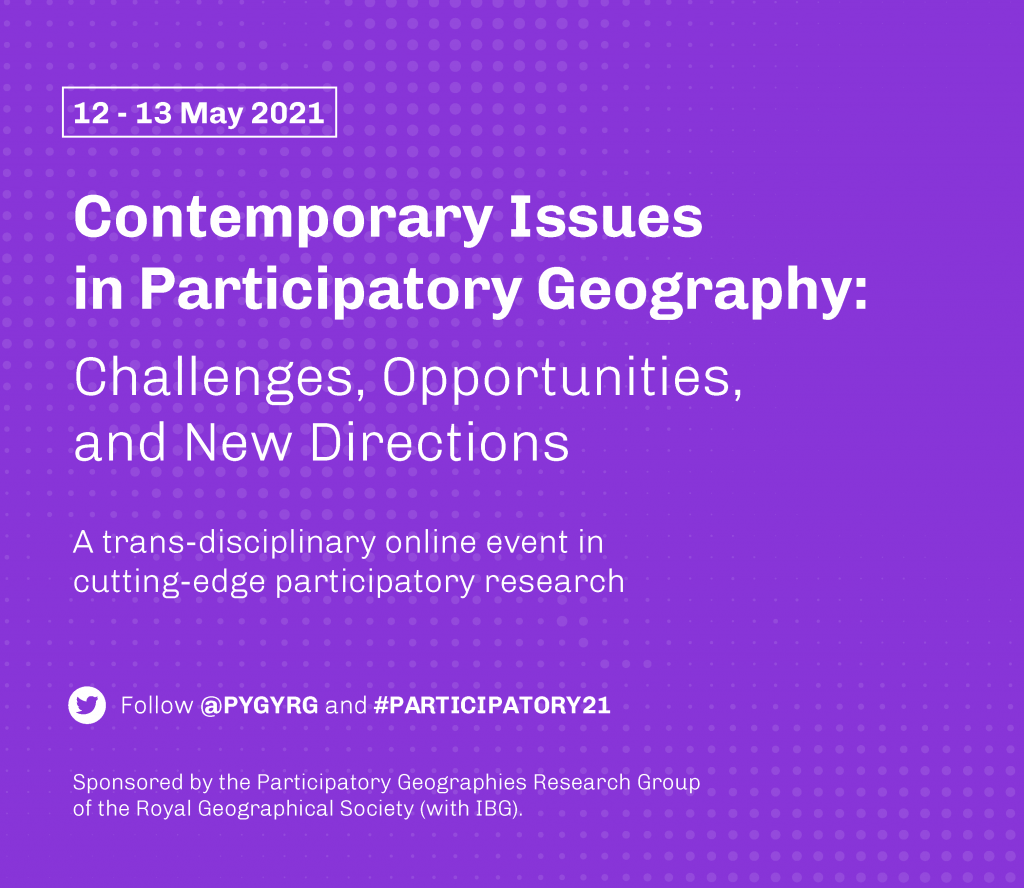Contemporary Issues in Participatory Geography: Challenges, Adaptations, and New Directions
A trans-disciplinary online event in cutting-edge participatory research
Wednesday 12th and Thursday 13th of May 2021
Register here: https://www.eventbrite.co.uk/e/contemporary-issues-in-participatory-geography-tickets-146500142871
Keep up-to-date: follow @PYGYRG and #PARTICIPATORY21
*** UPDATE 26/04/2021 – the event programme is live, view here ***
*** UPDATE 26/04/2021 – call for sessions now closed ***
Sponsored by the Participatory Geographies Research Group of the Royal Geographical Society (with IBG). Coordinated by Bruna Montuori, @brunamontuori (School of Architecture, Royal College of Art) and Caitlin Hafferty, @CaitlinHafferty (Countryside and Community Research Institute, University of Gloucestershire).
This event aims to bring together cutting-edge knowledge and practice in participatory research, transcending disciplinary boundaries and embracing different perspectives from academia, policy, and practice. We invite participatory researchers, activists, creatives, policy makers, and practitioners to attend presentations and discussions on current themes within participatory research. We welcome attendees from diverse backgrounds, career stages (particularly welcoming of postgraduate and early career researchers), and those within and beyond academia.
Themes for the event focus on issues, opportunities, and adaptations for participation in recent times – bringing together different insights and experiences to create a narrative for future directions in participatory research. This includes participatory and collaborative working in policy and practice arenas; barriers and adaptations in third-sector and grassroots community research; critical and reflexive participatory practices; issues and opportunities for online participatory research, including innovative tools and methods; new and emerging issues in social justice, (digital) ethics, and disparities brought about during the Covid-19 pandemic.
Over the course of two half-day sessions, the event broadly offers a space for knowledge sharing, discussion, reflection, and collaboration. This will include a mix of keynote lectures, interactive workshops, and opportunities to socialise and network.
We will release more details (including a schedule, full session details and a list of contributors) in due course. The event will be free to attend and held online via Zoom; a registration link will be launched in early March 2021 (this will be uploaded to our website, circulated on Twitter, and via email). Keep an eye out for updates by registering to the PYGYRG mailing list and follow @PYGYRG on Twitter (all updates will be posted using the hashtag #PARTICIPATORY21 so that those interested can click on the hashtag to see all associated Tweets).
If you have any questions or comments, please contact the event coordinators Caitlin Hafferty (caitlinhafferty@connect.glos.ac.uk) and Bruna Montuori (bruna.montuori@network.rca.ac.uk). For those who are not able to attend the “live” event, the sessions will be fully recorded.
Call for submissions: The art and practice of participatory research at the science-policy interface
Date: Wednesday, 12th of May, 2021 from 2 to 4 pm (GMT)
DEADLINE EXTENDED – 11TH APRIL
A myriad of complex issues facing the world: climate crisis and clean energy, public health, human rights and justice, conservation, social and economic development, education, and food security, are the target of an increasing number of policy documents, looking for solutions that call for transformative approaches. Policy specialists in health, education, environment, culture and the economy are unified in their invitations to breakdown disciplinary silos and advocate bringing together specialists and non-specialists to: define problems that are locally relevant but hinge on national and international governance, imagine desirable futures that cultivate inclusivity and improve the quality and relevance of research outputs. The approach is appealing in theory but can be difficult to achieve in practice. This workshop is targeted at individuals who are working to break down disciplinary boundaries and incorporate the voices of academic and non-academic actors in participatory or transdisciplinary research.
Participatory research and the covid-19 pandemic has made what is universally accepted as a challenging approach more difficult. In the past 12 months, social distancing has removed all possibilities of face to face interactions to establish, maintain or analyse any transdisciplinary co-enquiry. Whilst methods for collaboration have had to adapt, there are a number of principles to using participatory approaches when working with organisations that remain unchanged. This interactive workshop aims to create a set of guiding principles for the participatory researcher, community groups and large organisations interested in collaborating in socially relevant research at the science-policy interface.
We invite contributions from researchers, students, industry, civil society, and policymakers with experience or interest in participatory and collaborative working at the science-policy interface. The workshop aims to generate recommendations for participatory and collaborative working designed for a broad audience with a common interest in working beyond traditional disciplinary boundaries. There is no fixed format for contributions, examples include, but are not limited to, a traditional abstract, a digital short (videos of 3 to 5 min) or a recorded conversation.
The contributions will form material for the workshop which will be discussed and refined and published as a short guide for researchers – The art and practice of participatory research with organisations at the science-policy interface.
Please submit your ideas of one or two guiding principles explained in no more than 150 words to Thea Wingfield (t.a.j.wingfield@liverpool.ac.uk) and Laura Sobral laura@laurasobral.com by 11th April.
